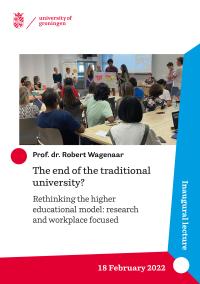The end of the traditional university? Rethinking the higher educational model: research and workplace focused
Synopsis
The 2nd half of the 1990s has been a pivot point for starting a period of reform of the European higher education sector which is still continuing. It resulted in far reaching reforms, such as the introduction of the Bachelor-Master structure, but also in a revolutionary change of the learning paradigm from expert driven to student-centred education. As a result, the quality of higher education programmes has significantly improved. However, the process has also led to a lot of red tape showing a serious decline of trust in academia and its academics.
This downturn can be related to the introduction of the concept of ‘new governance’ and as a follow-up the 21st century ‘modern university’ governance model in particular in Anglo-Saxon countries, but also in the Netherlands. As a consequence, the philosophy ‘profit-for-people’ has taken hold in society, including universities. This has resulted in the administrative culture crisis, which is now widely acknowledged, and has also influenced higher education institutions.
Was the transfer of an industrial society to a knowledge-based economy (digital revolution) an important cause for the 1990s pivot point, the fourth industrial revolution (Artificial Intelligence) is expected to have a substantial impact on the role of the university again. This next pivot point will change this role in society fundamentally.
It will also impact its governance model again, forced to give more credit to its professionals to allow for strengthening ‘academic freedom’, which has suffered as an effect of the reforms, and to open up higher education also to those who are already active in the workplace. This implies enhancing flexibility of educational programmes, the integration of the relative new phenomenon of micro-credentials (topics of specialized learning to upgrade knowledge and skills) and better alignment between higher education and society, including the world of work.
It will also ask for further international cooperation at the level of academics, in parallel to management and administration, by not only covering research but also education. Past experience has demonstrated that substantial change cannot be enforced, it requires a high level of involvement and commitment of the academics involved.
Academic staff is expected to keep up with the high speed of societal change which implies developing high level skills and competences and integrating the UN Sustainability Goals in their learning. A serious challenge, which has to be tackled in order to maintain relevance for society.
Design and layout: LINE UP boek en media bv | Riëtte van Zwol, Mirjam Kroondijk
Cover photo: R. Wagenaar
Author photo: J. de Jong
Published by University of Groningen Press
Broerstraat 4
9712 CP Groningen
https://ugp.rug.nl/
Downloads
Total downloads: 284

Downloads
Published
Series
Categories
License

This work is licensed under a Creative Commons Attribution-NonCommercial-NoDerivatives 4.0 International License.



